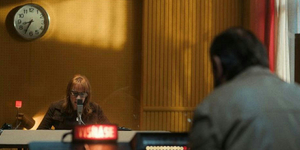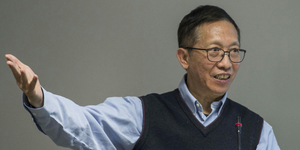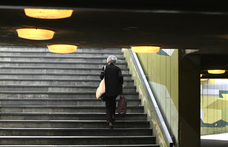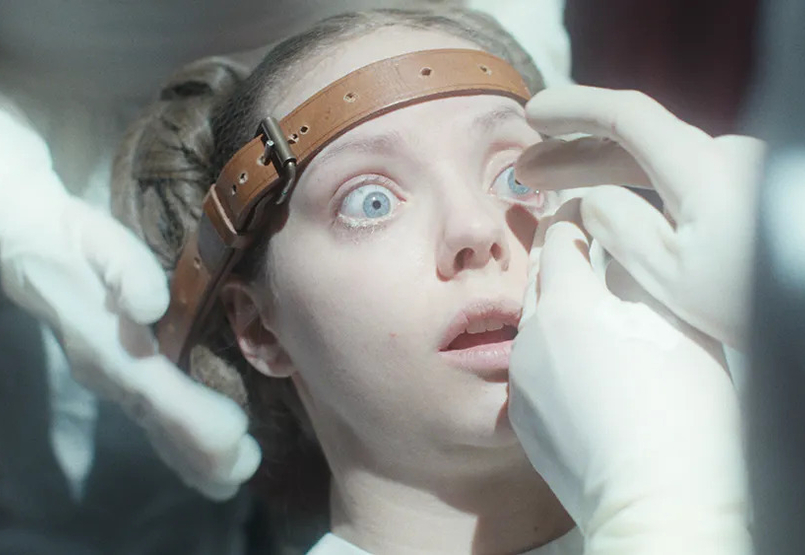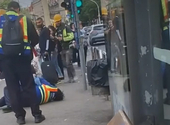You have condemned the Gonczol committee's report on the events of autumn 2006, including the riots and the causes of police violence. Why?
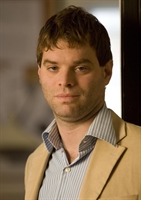 Balázs Dénes |
The report tried to come up with a conclusion about the autumn's events. It examined what happened, but in our view it focused on the wrong factors. This may be because the committee members see things differently from us. They did not answer the question of why police made mistakes on 18 September and 23 October. We feel that while they examined the reasons for the demonstrations, they did not examine the failings of the police and of the justice system with the same rigour. The public would have been more interested in answers to these questions than in ambitious streams of consciousness that manage to trace the roots of Hungarian society's problems more or less all the way back to Adam and Eve.
What does the HCLU do?
Since our founding in 1994, we have dealt with drugs policy, patients' rights and the defence of political freedoms. Amongst the most important of these are the freedoms of speech, of opinion and of free assembly. We run a legal aid service for people who come to us. Our lawyers try to focus on cases which can create a precedent which they believe will have an affect on the future application of the law. Most of our money comes from foundations, and we are helped by very well regarded advisers.
According to your our rules, we cannot accept government money or accept funding from any source linked to the state, nor can we apply for such funding.
The commission was asked to examine the legality and proportionality of the authorities' response to the events as well as to "judge those actions with particular respect to the human rights of those affected." Did they succeed?
Not really. The HCLU would have liked to see an explanation of tendencies that were visible long before autumn 2006. I'm thinking of the way the police have been subject to political influence since 2003, regularly violating political and civil rights, in particular the right to free assembly. At the end of May 2004, just one month before we joined the European Union, the police banned a demonstration held by people wanting compensation from the Baumag company. They claimed the demonstration would have had a disproportional effect on transport. But since 1 May 2004, demonstrations can only be banned if there are no alternative transport links that avoid the demonstration. The police explained their error by saying their CD of the laws of Hungary was out of date. But they used the same outdated justification again in September the same year.
The way police dealt with a demonstration by the Hempseed Association, which campaigns for the legalisation of marijuana, in spring 2003 is also worrying. The police have repeatedly been condemned by the courts and they have paid out several million forints of taxpayers' money in compensation, including to Imre Kocsis, head of the Conscience '88 Group. Police failings in September and October 2006 cannot be examined without reference to what happened before.
You condemned Fidesz's action, but you don't agree with the presence of a barrier on the square either.
Fidesz's actions in dismantling the barrier astonished us. We stressed that in a state governed by the rule of law, even illegal police actions cannot be met with equally illegal responses. At the same time, what is happening on Kossuth ter is clearly illegal. Every civil liberties organisation, every constitutional lawyer and expert began their analyses of the events by asserting that the barriers on the square were illegal. Police keep talking about a "zone of operations" which is a complete legal fiction. That term does not appear in the law on policing, only in the defence forces law - and it has no relevance to the right of free assembly.
Second part of the interview (Oldaltörés)
Why does the Gonczol report make no reference to this.
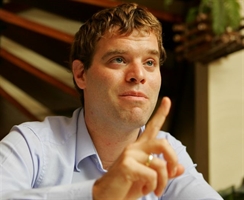 © Horváth Szabolcs |
The report's authors write that they do not wish to assume the role of the courts or the public prosecutor, so they will take no position with regard to this question. They are correct to do this, but they should still have addressed this concept of a "police zone of operations". For the same reason, the commission had nothing to say about concrete complaints about police overreach. Mihaly Vorosmarty, a retired police commander [he was commander of the Kadar regime's Revolutionary Regiment - ed.] wrote a dissenting opinion in which he addresses the issue - but in an outrageous fashion. He takes a relativist approach to police abuses on 23 October, writing that it is often impossible to assess what happened on the basis of television images. He suggests that if a demonstrator is being kicked while on the ground by a policeman, then it is impossible to know what happened beforehand. He also suggests that "police are people too," and that they were tense because of the constant attacks to which they were subject. This kind of apologia is unacceptable, even if it only appears in the form of a dissenting opinion.
Is it still unclear why authorities allowed protesters to camp out on Kossuth ter?
The Gonczol Commission argues that the police interpreted the law incorrectly. We agree with the police, however, since they have no right to set time limits on the freedom of assembly. But the commission argued that only concrete acts of assembly count - everything else must be subject to sanction. So, protesters cannot use freedom of assembly to justify living on Kossuth ter, they can't cook there, they can't attend to nature there. The authorities had the right to ensure that public health and hygiene regulations were being met without restricting freedom of assembly. This is the approach taken in Washington in front of the White House or in London in front of Parliament, bearing in mind noise nuisance restrictions. The protesters go home in the evening and come back with their placards the next day. Imposing similar restrictions on the Kossuth ter protesters would not need any change to the law on assembly - the law as it stands allows for all of this.
Did you contribute to the Morvay Commission as well?
We have made no secret of the fact that we sent our opinion to both the Gonczol and the Morvay Commissions. We have not made our opinion public because certain people concerned have requested that their personal information be kept secret. It would have been better if the other side's experts had contributed. It was their absence which led to the establishment of the Krisztina Morvay's commission, which was served by 'opposition' lawyers. Their report will follow the Gonczol Commission's.
You've sued Ferenc Gyurcsany in an attempt to get a study released to the public.
We asked the Prime Minister's Office to publish a study of the right of free assembly that was commissioned after the events of the autumn. The study, which was written by Antal Adam, a retired constitutional court judge, Tamas Ban, a former senior adviser to the Constitutional Court and Peter Tolgyessy, a constitutional lawyer, is unavailable, even though the Gonczol Commission quoted it at length. As a civil organisation, the HCLU has sued the prime minister for withholding a document of public interest. We think it likely that the government will use this secret document as an excuse to amend the law on assembly. The Gonczol Commission's interpretation implies that changing the law would allow for spontaneous demonstrations - it would no longer be necessary to ask for permission three days before the planned protest. We support this proposal, since it has been shown many times since the regime change that the 72-hour rule is not always practical.
János Pelle


